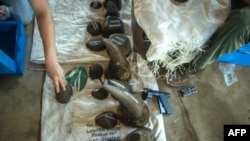South Africa's first online auction of rhino horn ends Friday, and thousands of bidders reportedly have shown interest. The three-day online auction was the first of its kind since South Africa banned the domestic trade in rhino horn in 2009.
Hundreds of horns weighing 500 kilograms were for sale. John Hume, the rhino breeder selling his stock, told VOA the rhinos were tranquilized before their horns were harvested. To participate in the auction, bidders were required to put down about $7,000 as a deposit.
Environmental groups have reacted angrily.
"We are concerned that the online auction is proceeding despite calls from all sides of the country," said Joe Shaw, rhino program manager at the World Wildlife Fund. "We advise the reinstatement of the domestic moratorium, at least until all the necessary control mechanisms, identified by the commission of inquiry into international trade, have been instated."
But Hume argues that the complete domestic ban had little impact.
South Africa is home to 80 percent of the world's remaining rhinos. However, according to government statistics, the country loses rhinos to poachers eager to traffic the horns to Asian countries where they are believed to treat various ailments, despite lack of scientific backing.
Hume says proceeds from the 264 horns in the online auction will help cover the $170,000 he spends each month to protect the herd of rhino on his land.
"If I don't sell rhino horn, in 10 years' time, my 1,535 rhinos out there are all going to be dead," he said.
Hume successfully challenged the domestic ban in court in 2015. In April of this year, parliament passed a law following the court order to allow limited domestic trade in rhino horn. Hume returned to the courts earlier this month to compel the Department of Environmental Affairs to issue him a permit for the auction.
Buyers at the online auction must agree that the horn will remain in South Africa after purchase.
However, WWF's Shaw and other animal rights activists argue that the government cannot ensure that the purchased horns do not find their way to China or Vietnam, where a kilogram can fetch up to $60,000 on the black market.
"We are worried about the capacity of the enforcement officials to manage this legal trade on top of all those existing challenges related to poaching and illicit trafficking of the horn, as well as potential risks to our wild populations, should horn laundering happen through these channels," Shaw said.
International trade in rhino horn has been banned since 1977.





